Low levels of serotonin are linked to depression, mood disorders, and digestive tract issues. Many people turn to microdosing cannabis as a potential method of increasing serotonin. Low Delta 9 THC doses seem to have antidepressant-like activity via boosting serotonin and alleviating anxiety symptoms.
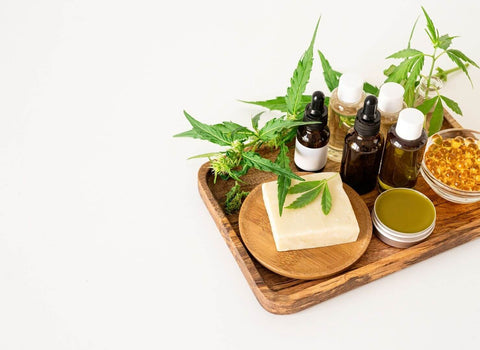
The best way to experience the benefits of microdosing cannabis is via quality edibles. Learn more about the therapeutic potential of low-dose Delta 9 THC in our extensive guide on the benefits of microdosing THC.
Not sure what Delta-9-tetrahydrocannabinol is? We’ve got you covered. Check out our awesome introduction to Delta 9 THC.
What is Serotonin?
Serotonin (5-hydroxytryptamine, 5-HT) is a neurotransmitter. It sends messages between nerve cells throughout the body. Serotonin is made from an essential amino acid called tryptophan. Essential amino acids cannot be made by your body and have to be obtained from foods, supplements, or medications.
When the amount of serotonin in the brain is too low or too high, this can lead to physical and mental problems. The lack of serotonin is thought to be a significant contributor to anxiety, depression, bipolar disorder, and other mood disorders.
Serotonin Deficiency
Low serotonin occurs for one or both of the following two reasons.
- Your body isn’t producing enough serotonin
- Your body is inefficiently using the serotonin you do produce
Many life factors can lower serotonin levels.
- Chronic stress.
- Poor diet. Protein-high foods, minerals, and vitamins are essential to build neurotransmitters, and the lack thereof can cause a neurotransmitter imbalance.
- Genetic factors.
- Digestive issues. About 90% of serotonin is produced in the intestines, and only 10% in the brain. Serotonin regulates bowel movements and its deficiency can disrupt the normal functionality of the digestive tract.
- Substance and drug abuse, such as caffeine, alcohol, nicotine, and some cholesterol-lowering medications, can deplete serotonin.
Typical symptoms of serotonin deficiency are sadness and depressive moods, low energy, negative thoughts, agitation and irritability, insomnia, food cravings, and reduced sex drive. More serious symptoms might be:
- Anxiety
- Panic attacks
- Hormone dysfunction
- Fibromyalgia and muscle pain
- Chronic pain
- Headaches and chronic migraines
- Obesity and eating disorders
How to Treat Serotonin Deficiency?
Selective serotonin reuptake inhibitors (SSRIs) are a common first line of defense against anxiety and depression. While it’s a popular belief that they produce more serotonin, SSRIs actually work by helping your body use available serotonin more efficiently. They block serotonin reuptake, allowing more of it to go to the brain.
One downside of antidepressant medications is that they can take weeks to have an effect on the patient. SSRIs also cause a range of side effects that not all patients seem to tolerate well. That’s why many people opt for natural methods.
In recent years, cannabis use in people suffering from anxiety and depression has increased. Taking small amounts of cannabis every day is the best way to reap the benefits of THC, CBD, and other helpful cannabinoids without experiencing psychoactive effects.
Are you new to microdosing? Check out our extensive guide to how to microdose cannabis to learn everything about this practice.
Can THC Increase Serotonin?
Recent evidence seems to suggest a strong connection between tetrahydrocannabinol and serotonin. A 2007 neurobiological study has found that a synthetic form of THC can effectively reduce depression at low doses.
The study, published in the Journal of Neuroscience, was led by Dr. Gabriella Gobi of McGill University. Her team injected laboratory animals with synthetic cannabinoids and tested them with the forced swim test, a test that measures depression in animal models. Cannabis compounds showed antidepressant-like effects and an increased activity in the serotonergic neurons (brain cells that regulate serotonin in the brain).
According to Dr. Gobbi, “low doses had a potent antidepressant effect, but when we increased the dose, the serotonin in the rat brain actually dropped below the level of those in the control group.” Her research demonstrated double effects of cannabis: increasing serotonin at low doses, and showing reversed effects at higher doses.
Yes, you read that right: at higher doses, cannabis seems to have the opposite effect: it depletes levels of serotonin and worsens depressive and psychotic conditions. That’s why we recommend you microdose THC, rather than consuming large quantities of it. It’s also why our collection of edibles is crafted to deliver the optimal dosage for folks wanting to experiment with microdosing.
The antidepressant-like effects of low-dose THC come from its chemical similarity to natural substances in our brain called endocannabinoids.
For more information on tetrahydrocannabinol and its effects, see our in-depth guide to THC.
The Role of the Endocannabinoid System
The endocannabinoid system (ECS) is a network of receptors that send signals through our body to regulate functions like sleep, mood, memory, appetite, and pain perception.
As a cannabinoid, THC interacts with the receptors in the endocannabinoid system and binds to the CB1 receptors. This interaction triggers an increase of dopamine and serotonin in the brain. The release of the “happy” hormones produces THC’s antidepressant-like effects. Dr. Gabriella Gobi’s study also demonstrates that cannabinoid CB1 receptors directly affect serotonergic neurons and aid the production of serotonin.
When THC binds to the CB1 receptor, blood rushes to the prefrontal cortex. The prefrontal cortex is linked to coordination and motor function and produces euphoria typically associated with the “high.”
At sufficient doses, THC can get the user high, but our edibles have sub-psychoactive amounts of Delta 9 THC for the majority of users.
Shop our Bliss gummies to experience the blissful effects of low-dose THC and cannabidiol (CBD). Only 5 mg of Delta 9 produces a sweet euphoric release that helps fight stress, anxiety, and symptoms of depression.
Do you want to learn more about cannabidiol? Check out this awesome CBD guide and learn how this potent cannabinoid can promote relaxation and pain-relief.
Effects of THC on Anxiety and Depression
Microdoses of THC can offer relief for people struggling with mood disorders and mental health. Low doses of cannabinoids can treat panic disorder, posttraumatic stress disorder (PTSD), obsessive-compulsive disorder (OCD), and social anxiety.
Anandamide is one of many natural endocannabinoids that our bodies produce. It is also known as the “bliss molecule,” due to its role in producing feelings of happiness. A deficit in anandamide seems to contribute to increased anxiety and depression. By interacting with cannabinoid receptors, THC mimics the function of anandamide, stimulating happiness and a sense of mental wellbeing.
In 2017 research on medical cannabis and mental health, the results showed that THC appears to act as a potent antidepressant in low doses of 7.5 milligrams. In contrast, a high-THC treatment increased anxiety and depressive behavior, reinforcing the paradoxical nature of THC to improve mental health at low doses and impair it at high doses.
The endocannabinoid system seems to regulate our emotional responses to stressful events and to feelings of anxiety and fear. Acute side effects of medical cannabis when taken at 12.5 mg or more were associated with significant increases in anxiety, panic reactions, and negative mood. At the same time, lower amounts of cannabinoids reduced anxiety and negative emotional responses in the study, expressing strong anxiolytic effects.
The research conducted by the University of Washington also included CBD and confirmed its soothing effects on THC. Let’s see how THC combined with CBD can increase serotonin.
Cannabinoids and Serotonin
A 2007 Journal of Neuroscience article found that cannabinoids elicit antidepressant-like behavior by activating CB1 cannabinoid receptors. They activate serotonergic neurons through the medial prefrontal cortex.
Research by renowned neuroscientists Gabriella Gobi and Guy Debonnel observed antidepressant properties of cannabinoids in the rat brain after conducting a forced swimming test. Via electrophysiological experiments, the researchers showed that low doses of a synthetic THC-based cannabinoid enhanced dorsal raphe nucleus 5-HT neuronal activity. The dorsal raphe nucleus is a brainstem nucleus that helps regulate functions such as learning and memory.
The study showed that higher doses of a synthetic cannabinoid were inefficient in the forced swim test and decreased 5-HT neuronal activity. This confirms the capacity of THC to worsen conditions like anxiety and depression at high doses.
It is believed that cannabis compounds—THC, CBD, CBG, and CBN—produce the best mental health results when taken in low doses and in combination with one another.
The Entourage Effect
THC and CBD appear to have more therapeutic benefits when taken together than separately. This synergistic interaction of cannabinoids, called the entourage effect, proposes that CBD can enhance the properties of THC and vice versa.
The best way to experience the entourage effect is with microdosing edibles that contain THC, CBD, and other minor cannabinoids, such as CBN, CBG, CBC. Our full spectrum CBD products offer the best results by combining small amounts of cannabidiol and Delta 9 THC. Shop our full spectrum products here and choose from a variety of shapes, colors, and flavors.
Take our Sleep Plus gummies, for example. Only 2 mg of THC combined with 25 mg of CBD and a touch of melatonin help you reach an eight-hour-long state of bliss every night.
Check out our guide on full spectrum CBD to learn more.
Does CBD Increase Serotonin?
Cannabidiol is the second most studied phytocannabinoid (plant-based cannabinoid). Because it lacks psychoactive properties, CBD does not make cannabis users high.
CBD is often used to manage psychiatric symptoms and treat conditions like major depression, bipolar disorder, and schizophrenia.
According to the University of Washington research, CBD showed potent anxiolytic effects at any dose. More research is still needed to establish the efficiency and effects of cannabidiol for reducing anxiety.
We’ve already mentioned anandamide, the bliss molecule, and its function to regulate mood, pain, emotions, and sleep. CBD interacts with the endocannabinoid system to enhance anandamide signaling, regulate sleep and pain, and treat symptoms of schizophrenia. According to the double-blind, randomized clinical trial, inhibiting anandamide deactivation may contribute to CBD’s anti-anxiety and anti-psychotic effects, and improve mood and sleep.
More research found that CBD treatments can reduce mechanical allodynia (painful sensations), decrease anxious behavior, and normalize 5-HT neuronal activity. This suggests that CBD interacts with serotonin receptors and indirectly boosts serotonin levels in the brain.
Another study shows that cannabidiol aids depression, anxiety, and psychotic disorders by targeting 5-HT-1A receptors. The activation of the 5-HT-1A receptors (serotonin receptors located in presynaptic and postsynaptic brain regions) has been linked to the mechanisms of anxiolytic, antidepressant, and antipsychotic medications. With its antidepressant-like behavior, CBD may activate serotonergic neurons, which increases serotonin in a natural, safe way.
In this regard, CBD can be seen as a potent antidepressant with broader applications and fewer side effects compared to traditional antidepressant medications.
The best way to experience the potent therapeutic effects of cannabidiol is with our CBD gummies. These delicious vegan products contain low doses of THC, CBD, and other cannabinoids to produce the entourage effect. Shop our CBD gummies and experience the benefits of microdosing contained in a variety of flavors and potency levels.
Broad Spectrum CBD
Despite the vast amount of scientific and anecdotal evidence supporting the beneficial effects of full spectrum CBD, many cannabis users choose a THC-free experience. Broad spectrum CBD contains no traces of Delta 9 and offers a pure CBD treatment to boost serotonin and improve mood.
You can purchase our Anytime broad spectrum gummies with 10 mg of premium, hemp-derived cannabidiol or try other broad spectrum products without THC. CBN gummies are a popular choice. This powerful CBD and CBN blend will relax and enhance the mood.
Shop our CBN gummies here and experience the magic of cannabinol. You can find all the information on cannabinol and its medical benefits right here in our ultimate guide to CBN.
For a closer look at the benefits of combining cannabis compounds, see our guide to the differences between full spectrum and broad spectrum CBD.
What is Serotonin Syndrome?
Serotonin syndrome is a disorder that occurs when levels of serotonin are excessively high. This happens when you take increased doses of antidepressant medications, dietary supplements, or other serotonin-increasing drugs.
As THC has been shown to increase levels of serotonin, some people worry that it might cause serotonin syndrome. Studies show that excessively high amounts of potent marijuana strains could lead to both serotonin syndrome and cannabis intoxication. This is why we strongly advocate for low-dose cannabis products, such as our fruitylicious Relax Plus gummies. With only five milligrams of THC, these watermelon-infused edibles make for the perfect evening escape.
Consuming microdoses of THC and CBD does not cause serotonin syndrome. All our edibles contain low amounts of THC (between 2 and 10 milligrams) combined with optimal dosing of CBD for the entourage effect. As long as you stick to low doses of Delta 9, you don’t need to worry about serotonin syndrome.
Product QUIZ
Need help deciding what product is best for you? Take our quiz, just three questions until your perfect match!
Indica vs Sativa
Indica and sativa are the two main varieties of cannabis. Each strain has its own unique benefits and effects on users. Similarly, each strain is used for different reasons.
Indica strains are relaxing and calming. Typically high in CBD, indica promotes pain relief and full-body relaxation due to its strong anxiolytic and analgesic properties. It’s popular for nighttime use and can effectively improve the quality of sleep.
Sativa is said to be more invigorating, promoting creativity and boosting energy. It can stimulate brain function and productivity, so cannabis users often choose sativa during the day.
Combining the effects and benefits of both varieties, hybrid strains contain a balanced blend of THC and CBD. They can be indica-dominant or sativa-dominant, but both offer relief from pain, insomnia, and anxiety. A favorite hybrid blend is our most delicious Energy gummies. They combine 5 mg of CBD and only 2.5 mg of THC to offer a balanced, energy-promoting experience, uplift the mood, and kill stress.
Check out the best weed strains for anxiety to learn more.
If you need more information about sativa and indica, see our guide to the best indica and sativa edibles for boosting serotonin and lifting the mood.
Did you know that low doses of THC and CBD can treat stage fright? People who suffer from social anxiety disorders, such as posttraumatic stress disorder, panic disorder, separation anxiety, and stage fright, often microdose cannabis to alleviate symptoms and improve mood and anxiety.
You can start with our low-THC Relax Plus gummies if you’re new to microdosing but would like to reap the benefits and help your anxiety. 25 mg of CBD produces a mind-soothing effect, which makes these delish gummies a perfect introduction to microdosing cannabis for depression, too.
Best Edibles to Increase Serotonin
Edibles are the most effective way to microdose cannabis. While other consumption methods might be faster-acting (with smoking and vaping, you can feel the effects almost immediately), edibles offer a delayed experience. After munching on our delicious fruity gummies, you’ll be able to feel the effects somewhere between 30 minutes and two hours.
Microdosing edibles also delivers a longer-lasting experience. The effects of cannabis when smoked or vaped typically wear off quickly, but with edibles, you’ll be able to enjoy the effects for up to eight hours.
To help you boost levels of the “happy hormone,” we have devised a list of our favorite anti-anxiety edibles. These vegan goodies employ the therapeutic potential of low-dose THC and CBD to enhance relaxation and treat symptoms of serotonin deficiency.
- Our Relax Plus gummies might just be the top product for microdosing if you’re struggling with anxiety and depression. They contain 25 mg of premium CBD with a touch of hemp-derived Delta 9 THC, a mighty combo in enhancing relaxation.
- A slightly more balanced ratio of CBD and THC can be found in our phenomenal Energy gummies. Aside from boosting energy and improving focus, these vegan edibles might be the best solution for treating upset stomachs and nausea and alleviating symptoms of the digestive tract imbalance. They could come in handy when your stage fright kicks in right before your presentation.
- People with low levels of serotonin often experience chronic pain in muscles or nerves. Microdosing edibles can alleviate pain, including neuropathic, arthritic, or fibromyalgia-related pain. Our Bliss gummies contain an equal ratio of THC and CBD (5 mg each in every scrumptious gummy), which makes these honeydew-infused bites a great way to soothe pain receptors.
Is Microdosing Legal?
Microdosing edibles is considered the safest and most reliable way to consume cannabis. THC and CBD in our gummies are legal on a federal level since they are compliant with the 2018 Farm Bill.
To be Farm Bill compliant, Delta 9 THC must be derived from hemp, not marijuana (see the differences between marijuana and hemp here), and the THC content must not exceed 0.3% on a dry weight basis.
This makes all nama products containing hemp-derived Delta 9 federally legal in the US. The legality of THC and CBD derived from hemp varies from state to state, so it’s always a good idea to check if Delta 9 is legal in your state.
Frequently Asked Questions About Serotonin
Are dopamine and serotonin the same?
Dopamine and serotonin are both neurotransmitters that act as hormones. They perform similar functions in the body but also differ in some ways.
- Dopamine and serotonin are both considered “happy” or “feel-good” hormones; they boost mood and positive emotion.
- Dopamine is more associated with motivation and reward, while serotonin is linked to happiness, focus, and calmness.
- Dopamine controls coordination and movement. Serotonin helps in the regulation of our digestive system.
- They both regulate and influence the quality of sleep. Our brains also rely on melatonin, a hormone which is produced by serotonin, to regulate the sleep-wake cycles.
- They are both involved in mental health. Imbalance in the levels of serotonin and dopamine can lead to the disruption of our mental health.
Microdosing THC can also boost dopamine levels, improving mental health.
Do you want to learn more about melatonin and its connection to serotonin? Check out our in-depth guide on melatonin. We know melatonin is a powerful sleep aid, and there is no better way to help you sleep better than taking our high-quality sleep edibles with melatonin.
Can cannabinoids increase brain cells?
Microdosing cannabis may be a potential treatment for neurodegenerative diseases that tend to cause neuronal death. Studies suggest that THC and CBD are neuroprotective: due to its anti-inflammatory and antioxidant properties, low doses of cannabis can treat dementia, Alzheimer's, and even help reverse brain aging.
The neuroplasticity of CBD and THC also appears to help generate new brain cells. This process, called neurogenesis, creates new neurons in the brain, thus aiding memory and learning and preventing cognitive decline. Read more about how THC and CBD can promote neurogenesis.
Is CBD or THC better for anxiety?
Either cannabis compound can be used to reduce anxiety and alleviate symptoms of anxiety-related health conditions. Many people take THC and CBD to treat social anxiety disorders, panic attacks, PTSD, depression, and many other conditions.
It’s important to remember that THC can ease symptoms of depression and anxiety when administered in low doses, while higher doses of Delta 9 THC may worsen depression, anxiety, and other mood disorders. Stick to small amounts, and for the best results, microdose products that contain both cannabinoids. (Did you already forget about the entourage effect?)
For a more detailed look at how THC and CBD treat anxiety and other medical conditions, check out our guide on the differences between THC and CBD.
How can I naturally increase serotonin?
Here are some natural remedies you could try if you’re lacking serotonin:
- Mood induction. This experimental treatment involves doing something you like that relaxes you and gives you pleasure.
- Physical exercise. Preclinical studies confirm that physical activity can raise serotonin.
- Nutrition and a healthy diet may also help. Foods and supplements rich in tryptophan aid the production of serotonin.
- For people struggling with low serotonin levels, exposure to sunlight is crucial.
Resources
“Study: Cannabis a Double-edged Sword.” Newsroom, 23 Oct. 2007, www.mcgill.ca/newsroom/channels/news/study-cannabis-double-edged-sword-27677.
Gobi, Gabriella, and Guy Debonnel. “Cannabinoids Elicit Antidepressant-Like Behavior and Activate Serotonergic Neurons Through the Medial Prefrontal Cortex.” Journal of Neuroscience, 2007, www.jneurosci.org/content/27/43/11700.
Russo, Ethan B. Cannabidiol Claims and Misconceptions. Volume 38, vol. Issue 3, Science Direct, https://doi.org/10.1016/j.tips.2016.12.004.
Leweke, F. M., et al. “Cannabidiol Enhances Anandamide Signaling and Alleviates Psychotic Symptoms of Schizophrenia.” PubMed Central (PMC), 20 Mar. 2012, https://doi.org/10.1038/tp.2012.15.
Gregorio, Danilo De, et al. “Cannabidiol Modulates Serotonergic Transmission and Reverses Both Allodynia and Anxiety-like Behavior in a Model of Neuropathic Pain.” PubMed Central (PMC), 28 Dec. 2018, https://doi.org/10.1097/j.pain.0000000000001386.
García-Gutiérrez, María S., et al. “Cannabidiol: A Potential New Alternative for the Treatment of Anxiety, Depression, and Psychotic Disorders.” MDPI, 19 Nov. 2020, https://doi.org/10.3390/biom10111575.
Baltz, Jacob W., and Lamanh T. Le. “Serotonin Syndrome Versus Cannabis Toxicity in the Emergency Department.” PubMed Central (PMC), 2 Mar. 2020, https://doi.org/10.5811/cpcem.2020.1.45410.
Hampson, A. J., et al. “Cannabidiol and (−)Δ 9 -tetrahydrocannabinol Are Neuroprotective Antioxidants.” Proceedings of the National Academy of Sciences, vol. 95, no. 14, Proceedings of the National Academy of Sciences, July 1998, pp. 8268–73. Crossref, https://doi.org/10.1073/pnas.95.14.8268.
Basso, Julia C., and Wendy A. Suzuki. “The Effects of Acute Exercise on Mood, Cognition, Neurophysiology, and Neurochemical Pathways: A Review.” PubMed Central (PMC), 28 Mar. 2017, https://doi.org/10.3233/BPL-160040.
Jenkins, Trisha A., et al. “Influence of Tryptophan and Serotonin on Mood and Cognition With a Possible Role of the Gut-Brain Axis.” PubMed Central (PMC), 20 Jan. 2016, https://doi.org/10.3390/nu8010056.
nama CBD FDA & Legal Disclaimer
This article is for informational purposes only, and does not constitute medical advice. Our products are not intended to diagnose, treat, cure, or prevent any disease. They are not a replacement for prescription medications and have not been evaluated by the Food and Drug Administration (FDA).
The information provided on this website does not, and is not intended to, constitute legal advice or any statements of the status of any laws. Any information, content, and materials available on this site are for general informational purposes only, and are not intended to be relied upon for any purpose.
Readers of this website should contact their attorney to obtain advice with respect to any particular legal matter including decisions on what products are, or are not, legal to sell, possess, or consume. No reader, user, or browser of this site should act or refrain from acting on the basis of information on this site without first seeking legal advice from their own counsel in the relevant jurisdiction.
Only your individual attorney can provide assurances that the information contained herein – and your interpretation of it – is applicable or accurate for your particular situation. Use of, and access to, this website or any of the links or resources contained within the site do not create an attorney-client relationship between the reader, user, or browser, and website authors, contributors, contributing law firms, or committee members and their respective employers.
More From the nama Family
Small batch edibles crafted for different times of the day and experiences.
More articles
About
Learn
Join us on this journey

© Copyright 2025 nama Products LLC. All Rights Reserved.
†These statements have not been evaluated by the Food and Drug Administration. These products are not intended to diagnose, treat, cure or prevent any disease. All information presented here is not meant as a substitute for or alternative to information from health care practitioners. Please consult your health care professional about potential interactions or other possible complications before using any product.
††The information provided on this website does not, and is not intended to, constitute legal advice or any statements of the status of any laws. Any information, content, and materials available on this site are for general entertainment purposes only, and are not intended to be relied upon for any purpose.
123 John Doe Street
Your Town, YT 12345
Store Hours
Sun: Closed
Mon-Fri: 9:00 - 17:00
Sat: 10:00 - 13:00
What to expect at pickup
Closed
Closing at 5pm
Closing at 5pm
Closing at 5pm
Closing at 5pm
Closing at 5pm
Closing at 1pm





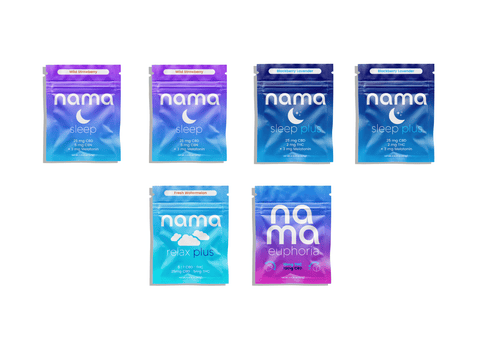
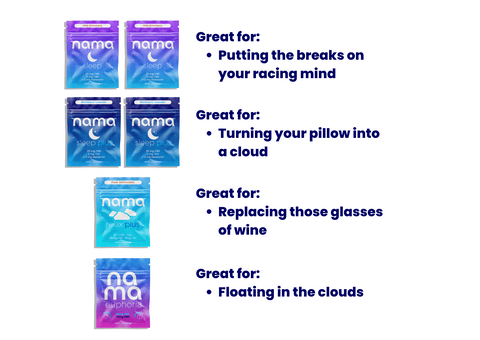
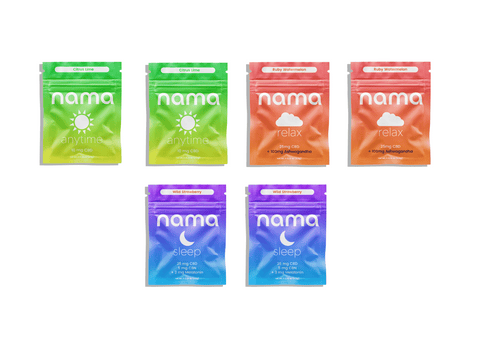
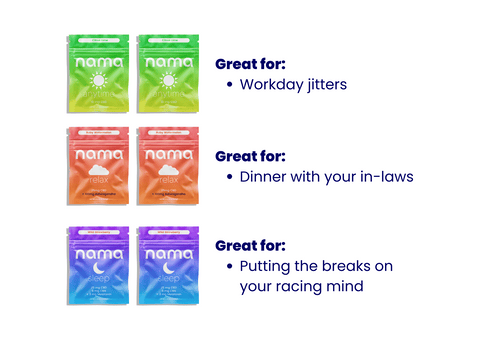
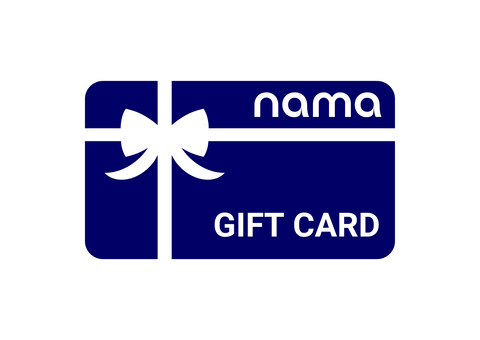







![Buzz Packs™ [THC and CBD Powder Drink Mix]](http://www.namacbd.com/cdn/shop/files/nama_buzz_packs_thc_drink_pack_white_background.png?v=1741884660&width=480)
![Buzz Packs™ [THC and CBD Powder Drink Mix]](http://www.namacbd.com/cdn/shop/files/Buzz_Packs_Label.png?v=1741884660&width=480)


![Buzz Drops™ [THC Drink Drops]](http://www.namacbd.com/cdn/shop/files/nama_thc_buzz_drops.png?v=1711412866&width=480)
![Buzz Drops™ [THC Drink Drops]](http://www.namacbd.com/cdn/shop/files/buzz-drop-wine-comparison.png?v=1736882023&width=480)


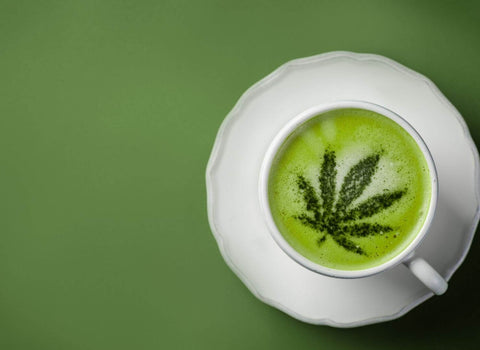
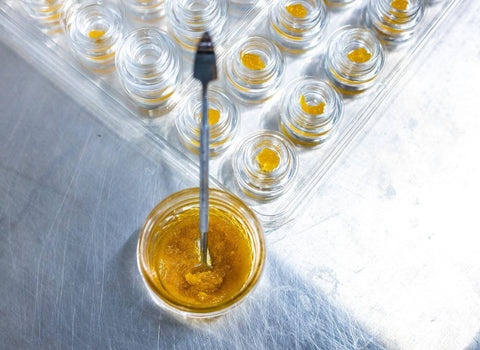


Comments (0)
There are no comments for this article. Be the first one to leave a message!